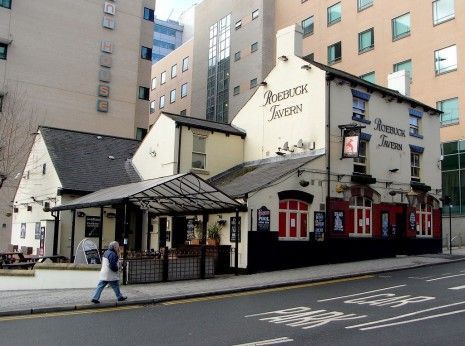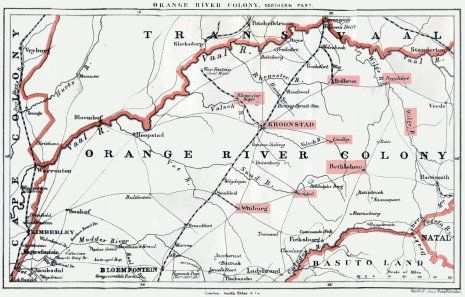Children of Cherrytree: Horace Ford
Horace Ford was born in Sheffield on 22 April 1880. His mother was Elizabeth Furniss, the daughter of John Furniss, a brace bit manufacturer from Ecclesall. His father was John Herbert Ford, the eldest son of Joseph Ford who for many years had a printers, booksellers and newsagents business at 70 Pinstone Street, Sheffield before taking over the licence to run the Roebuck Tavern, 8 Charles Street, in February 1870.
Horace's parents had married on 12 June 1864 at the Sheffield Parish Church (later the Cathedral Church of St. Peter and St. Paul). John Ford had worked an apprenticeship as a grinder before his marriage but he later became a beerhouse keeper at the Star & Garter in Winter Street, Crookesmoor. After John's father died in 1873 his mother Sarah Ford, nee Wolstenholme, inherited the family printing business and John became a manager in the firm whilst living at the Roebuck, which was presumably being run by Horace's mother.

The modern Roebuck Tavern, Charles Street
John and Elizabeth Ford had at least seven children and possibly more as the first child we have found, Elizabeth, was born in 1872 eight years after their marriage. Four more children followed in quick succession: Joseph (1875), John Herbert junior (1876), Alice Ada (1878) and Horace (1880). Sadly, both John junior and Alice Ada died in infancy even before Horace was born. Twin daughters Dorothy and Catharine were born in late 1883 shortly before their father died on 13 December. Dorothy died aged 3 months on 9 February 1884; we don't know what happened to Catherine.
The surviving children became orphaned when their mother died on 24 May 1884. Joseph had been living with his widowed grandmother in Wolstenholm Road, Sharrow and later in lodgings in Heeley having become a steel hardener. On 17 October 1894 he enlisted in the 3rd (Militia) Battalion of the Yorkshire Regiment. His service was intended to last six years but on 6 May 1896 Joseph purchased his discharge and continued with his occupation in steel making. Horace attended Cecil Road School in Sharrow until he was aged 8 when he was sent to Cherrytree Orphanage, Mickley Lane. The Ford family made a significant financial contribution towards his stay there so perhaps his grandmother simply couldn't manage to look after him.

Cherrytree Orphanage, Mickley Lane
Horace entered the Orphanage on 26 October 1888 and left aged 14 on 8 October 1894 to work as an apprentice to Messrs. G. & F.B. Howard, blacksmiths and shoeing smiths of 65 Penistone Road. The placement appears to have been found by Mr. G. Jackson Smith, a member of the Orphanage Executive Committee, who furnished regular reports on Horace's development e.g. "His conduct and progress are highly satisfactory and his employers think that with good management he will do well." Mr. Smith's last report was sent on 26 April 1898, soon after Horace's 18th birthday.
At Doncaster on 9 February 1900, Horace enlisted as a Private in the 66th (Yorkshire) Company of the Imperial Yeomanry to serve his country in the war in South Africa. Service was to be for a period of one year or until the end of the war if it lasted longer. By 13 March 1900 he had arrived in South Africa. This item appeared in the Sheffield Daily Telegraph on 25 July 1900.
A Former Cherrytree Orphanage Pupil at the Front.
Mr. G. Jackson Smith, of Hazlewood, Ranmoor, Sheffield, favours us with a copy of a letter he has received from a former pupil in the Cherrytree Orphanage, who is now serving in the 66th Company of the Imperial Yeomanry in South Africa. The letter which with have special interest for the friends of the Orphanage is as follows:-
Winburg, June 24th 1900.
Dear Mr. Smith - No doubt you will be surprised at not hearing from me before now, but I was determined I would not write to you until I could tell you the news that I have been in action, but I expect you will have read about it in the papers long before you receive this letter.
We started from Winburg on the 21st along with another company of yeomanry (Wilts.), and a number of mounted infantry to escort a large convoy to Senekal, a distance of about forty miles, but on the morning of the 22nd we met General Clements' force with an empty convoy coming back from Senekal, who ordered us back, as a large body of Boers was in the surrounding hills with several guns, and our escort was not large enough to tackle them. On the 23rd both convoys were to proceed to Winburg, so we got from beneath our frost-covered blankets at 4 a.m., had breakfast at 5 a.m., and set off to see if was safe for the convoy to move. Well, we hadn't got above half a mile from camp when we saw a large shell burst just over it and after that about a dozen more bursts right into it, killing several horses, one man and injuring nine more. Then the Boers must have seen us, for a shell just missed my company by a few yards, which made us move a lot quicker to reach a little less elevated ground about a mile away. It was the hottest mile I ever travelled; bullets were whistling around us like hail, and when we dismounted we were only about five or six hundred yards from the enemy. I will own that I felt a bit shaky at first, but when the order came to blaze away at them, all fear went. My only thought was to give it them as hot as we got it, which, I think, we did, for we made their position a bit too hot and they retreated to the hills after about two hours' fighting.
The Yorkshires had four men wounded and several horses. I found a bullet hole through my great coat this morning, rather a near shave. We have now got the convoys safe, and with a larger force and a few guns we are setting off to give them a d----d good hiding, so I shall have more news to tell you next time I write. So now I shall have to finish off, as I have some work to do - Believe me to remain, yours truly.
Horace Ford.

Orange River Colony in the Boer War
Even though he had signed up for a year or the duration of the war, Horace's service record shows that he applied for voluntary discharge having served 255 days, 233 of which were in South Africa. He was formally discharged at Johannesburg on 21 October 1900. He was awarded the Queen's South Africa Medal with three clasps: Wittenbergen, Cape Colony and Transvaal. His conduct and character whilst serving with the Colours were described as being 'very good' and it was noted that he intended to follow the trade of blacksmith at Sydney Road, Durban.
When General Roberts left South Africa in December 1900 he pressed for a return of the volunteer infantry companies and the original contingent of the Imperial Yeomanry or risk the consequences for recruiting future volunteer forces. The men had done enough. Recruitment began immediately for a second and larger contingent of Imperial Yeomanry.
